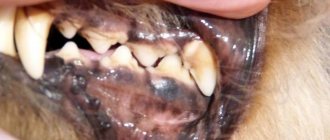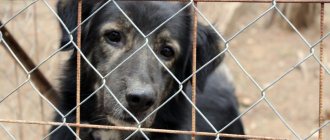Dobermans are a service breed that requires systematic and competent training. These dogs need the severity and authority of the owner, but not cruelty, so their upbringing should be under the supervision of an experienced dog handler.
With timely and correct training in commands, a Doberman puppy will grow up to be an affectionate and loyal dog, capable of protecting its owner.
Is it possible to raise a Doberman?
Statistics on recognized breeds state that out of four hundred, only nine carry the official designation of a working dog. And the Doberman is included in this number.
Stanley Conor in his book “The Intelligence of Dogs” noted the excellent trainability of this breed. Therefore, the answer to the question is clear: yes, really. It’s just that the Doberman, like any other dog, requires an approach during training.
Since ancient times, this breed was intended for protection. That is, the dog’s task was to protect the owner and, if necessary, attack the enemy. Therefore, when training an animal, it is important to pacify its militant nature.
The main thing is to educate correctly and wisely.
The struggle for dominance: how to assert the authority of the owner
In this case, the distribution of roles is not achieved by rigidity. You need to communicate with the dog in a language that it understands.
In order for the owner to defend his authority and leadership, he must follow the basic rules:
- Clear mode.
Stick to a certain daily routine. Each event has its own time. This is especially true for feeding and walking. - A leader is always ahead.
During a walk, the dog walks slightly behind - a third or half of the body, and is the last one to enter or leave the room. Always. Some owners make an exception for potentially dangerous places: cars, elevators, public transport. - The dog eats last.
The animal is fed only after everyone in the household has eaten. A Doberman will have a clear picture in his head: first the “leader” eats, then those close to him, then those at the bottom of the hierarchical ladder. No feeding or treats from the table. - The leader is the undisputed winner.
Fetching, games of tug-of-war and “who is stronger” will help consolidate the status of the owner. But you can't lose. During the period of teeth change (from 3 to 6 months), it is better not to practice such entertainment. - Teams come before games.
If a puppy jumps on a person or frolics at the wrong time, it must be ignored. You can be upset, but it is better not to give your pet any attention. - Calmness and endurance.
Cruelty is not allowed. The owner must be balanced and not transfer a bad mood to the dog, even if he disobeyed. Screaming and beating are perceived by the Doberman as cowardice and weakness. - Instant punishment.
You should scold a puppy at the moment when he is mischievous. Maximum – within 10 minutes after the offense. Afterwards it’s useless: the animal will already forget what it did and blame the punishment on the owner’s bad character. - Subsequence.
If something is prohibited for a Doberman now, it will also be prohibited in the future. It is better to determine all the rules before the baby gets to the new home and familiarize family members with them.
While the puppy does not understand the commands, he is completely guided by intonation. An affectionate and encouraging tone tells him that his actions are correct. Strict and judgmental - about the owner’s dissatisfaction.
Since Dobermans are dominant dogs, mild physical punishment is allowed. Spanking with a newspaper, pinching, clicking on the nose sometimes helps better than a stern tone, deprivation of toys, or lack of games.
Another effective method is to press a presumptuous Doberman to the floor. You can also carefully lift the dog by the scruff of the neck and shake it. It is better to do this in puppyhood. It is difficult to perform such a trick with an adult dog.
Character of the breed
The docked tail and ears give the Doberman a stern look. However, in its natural, natural appearance one can discern a good-natured disposition. Dobermans love their owners. They are affectionate with family members, but for proper training it is important that the dog obeys only one person in the house.
Despite this behavior with “their own”, Dobermans are distrustful of strangers. And this can result in open aggression.
If the pet perceives the stranger’s gestures as threatening, the attack will not be long in coming. Moreover, even a harmless pat on the shoulder can be taken as a threat. On an instinctive level, the beast always protects the pack family.
The attitude towards other animals can be easily adjusted during training.
The breed is suitable for security and search activities, sports competitions, and also for keeping as a pet.
Typically, Doberman Pinschers have the following traits:
- energy (which needs to be directed in the right direction);
- learning ability;
- vigilance.
These are smart dogs with good health. However, they tend to howl and bark if left alone at home. Therefore, the puppy must initially be accustomed to the fact that sometimes he will spend time alone.
There are two periods when the pet “tests the owner’s strength.” These are ages 3 and 8 months. This happens because under natural conditions the dog lives in a pack, where it is necessary to fight for leadership.
Important! All of the listed properties relate to the general characteristics of the breed. Each dog is individual and may differ in character from its peers. At the same time, Dobermans have mental illnesses that are inherited. Therefore, it is initially important to choose a breeder wisely.
Choice of treats
The selection of treats is individual for each dog. You will have to experiment and offer the animal different variations of treats: meat and offal, cottage cheese, specialized dog treats, cheese (not recommended in large quantities).
As a rule, dogs prefer meat products most of all. Meat and offal can be given raw or cooked - at your discretion. It is more convenient to work with a boiled treat, but a raw treat will bring more vitamins to the animal’s body.
Dogs are still predators, and they are adapted to digest raw foods (perhaps with rare individual exceptions). The main thing is to buy quality products from trusted places.
The more smell the treat has, the more interested your pet will be in it. Choose a more fragrant type of meat or offal (not to be confused with rotten). In order to enhance the effect, you can cook the meat in water to which garlic has been added. After cooking, be sure to remove the garlic if it gets into pieces of meat. Such a treat is safe and more interesting for the animal due to the enhanced pungent odor.
Doberman training: general rules
Raising a Doberman requires strictness. But at the same time, it is important to let the pet know that he is loved. Cruelty will turn the dog into an angry and nervous creature. If you are too soft, the Doberman will become uncontrollable.
This breed is not suitable for keeping in an aviary. It is important for a pet to have contact with family members. In addition, Dobermans play well with children. But the dog must be raised by an adult or a teenager of about 14 years old.
Dobermans need to be trained from an early age. Already as a puppy, he shows character. Therefore, the boundaries of what is permitted must be outlined immediately. The Doberman learns quickly, but at the same time, with enviable regularity, it can test its owner’s toughness.
In this regard, it is important to achieve strict execution of commands during the training process, but at the same time be consistent yourself. There is a reward for obedience. For refusal - censure.
Dobermans quickly learn information. At the same time, it is not necessary to resort to treats as encouragement. This breed values praise and affection. Therefore, the emotional connection between the owner and the dog must be deep. It’s good to call your pet to you to play and just stroke it.
If you call the Doberman only when it’s time to go home, the smart dog will quickly understand what’s going on and “stop hearing” the command.
A well-mannered dog should:
- do not show unreasonable aggression towards people;
- treat other animals normally;
- do not react to sudden sounds.
Important! The owner of the Doberman himself must correspond to the declared status. To have such a dog, you need to be calm, confident and consistent.
When to start training and education
Raising a Doberman puppy should be done in a playful way. The optimal time is about 15 minutes. The commands must be studied one at a time. When the dog masters one, you can start the next one.
Important! It is necessary to achieve precise execution of the exercise. To reinforce it, it is recommended to give the learned command several times a day, and in different situations.
It is better to train a new team at the beginning of the lesson. The optimal time for training is 2-3 hours before and after meals (morning and evening).
Reward and punishment in training
In the process of raising and training, it is important to show love for your pet. A good way to let your pet know that its owner is happy with it is to play with it. So you need to take dog toys with you to every walk or activity.
You can reward the animal with treats. But the main thing is not to overdo it so that the dog doesn’t get fat.
Important! Dobermans are prone to food allergies. Therefore, you need to choose your treats wisely.
Raising smart and stubborn Dobermans, alas, is not without punishment. However, caution must be exercised here too. You should not hit the dog or yell at it.
If the puppy does not comply with the prohibiting command, you need to take him by the withers and shake him slightly. A biting or snarling pet is pressed to the floor.
Prohibitions in training and education
Every growing dog develops behavioral habits. They are determined not only by the type of training, but also by the individual characteristics of the animal.
Even when positive behavior is rewarded, a Doberman may do something inappropriate. You need to get rid of these moments immediately before they enter the consolidation phase.
The most common problems in parenting:
- reluctance to go to the toilet outside;
- damage to shoes;
- reluctance to wear a muzzle;
- barking when meeting the owner.
It is important for the wife to immediately teach the dog proper behavior in society. This will save the owner from a number of problems in the future.
How to teach behavior on the street?
Often, owners witness when a dog flatly refuses to obey - tries to pull out the leash, shows aggression towards passers-by, or collects small change from the ground with interest.
Firstly, you are taught not to pick up dogs from the ground in early childhood. The signal is the command “Fu” and its emotional connotation. A muzzle also copes with this task.
Secondly, aggression is a defensive reaction, which can also be a consequence of an incorrect relationship between a person and a dog.
Thirdly, walking is another way to learn something new rather than deviate from the old. A pet’s disobedience is a reason not only to think about the method of education, but also to bring it to automaticity.
NOTE!
The Doberman must learn that “who leads whom, leads,” and not vice versa. As a rule, a tight leash brings discomfort to the dog, and this is a reason to wonder what’s wrong? Therefore, the Doberman must at least stop.
Starting training at home
The period of 3-16 weeks is a time of active exploration of the world. From this moment you need to start raising and training your pet. Accustoming to the owner's gestures, praise and blame is what the baby must learn first.
From the age of 4 months, the puppy’s memory processes are activated. Therefore, it is worth praising him as much as possible. This will definitely be embedded in his subconscious.
And it is even more important to immediately stop unwanted behavior. Then the puppy will develop a clear connection between which actions will cause praise and which will result in punishment.
General information about the dog
Speaking about the Doberman, we can say that they are smart dogs with a lively mind and excellent reaction. This is a very brave and at the same time noble breed.
However, they require a special individual approach, which is determined by the innate desire for dominance; Dobermans can be very cunning, which is not always beneficial.
Taking into account all the behavioral features of these dogs, experienced dog breeders recommend that beginners be careful when buying such a pet. But if you decide to get a Doberman, we will try to tell you as much as possible how to raise a puppy at home, as well as about the peculiarities of training.
Master's authority in training and education
The Doberman must know what place it occupies in the house. And if the owner does not assert himself in the place of leader, the dog will try to fill the vacancy.
General recommendations for training and education:
- Determine what is not allowed and what is possible. For example, you should not give in to the pitiful eyes of a pet begging for food from the table. The dog must know that he eats only in the designated place and only from his bowl.
- Do not allow someone to occupy your personal space without permission. For example, if the dog jumped onto the sofa, you must give the command “No!” If the animal calmly approaches and asks for permission, act at your own discretion.
- Praise and punishment follow immediately after the action.
- Aggression is stopped immediately.
- The owner determines the animal's daily routine, and not vice versa.
- Upon returning from a walk, the person enters the house first, the dog after him.
- It is important to maintain emotional balance. The Doberman is a sensitive animal that will instantly pick up on fear or nervousness.
What can be taught?
The breed has successfully proven itself in many types of service and sports, so the last thing the owner should worry about is the range of activities of the dog.
Doberman Pinschers are predisposed to:
- search and rescue service;
- protective guard service;
- search (search for things, people, animals, prohibited means, etc.);
- protection of territories or property;
- “bodyguard dog” positions.
Dogs have a number of useful characteristics. Thanks to their sense of smell and intelligence, they are in demand at customs, serve in the police and at the border.
These animals are easily given OCD, so if the owner does not intend to build a career for the pet in official activities, then you can always give in to sports.
Animals demonstrate good learning ability in competitions in:
- canicross (musher dog);
- dog-pulling (tug-of-war);
- agility (speed overcoming barriers);
- frisbee dog (catching a flying disc);
- waitpulling (dragging a load over a certain distance);
- pitch-and-go (quick fetch offering);
- freestyle (a combination of obedience exercises and tricks to music);
- bike joring (a sledding sport where instead of a dog sled, dogs pull a bicycle);
- scooter (a type of snowless sport where the dog pulls the owner behind him on a scooter);
Doberman is without a doubt a worthy competitor in the fight for the main prize.
Training and education monthly
| Month | Training and education |
| 1-2 | Accustoming to a nickname and toilet in a diaper. Training not to pull on the leash, not to chew on objects, not to howl when no one is home. A ban on biting is mandatory, even during play. |
| 3 | Prohibition of taking food from strangers. Toilet training outside. Endurance when guests arrive. A calm attitude towards people and animals while walking. |
| 4-5 | The puppy is cunning, and therefore may not “hear” commands. During this period, it is important to immediately stop unwanted behavior. Everything must be done right the first time. |
| 6 | We teach obedience again. The dog tests the owner’s strength: “What will happen if I don’t obey?” Therefore, it is necessary to consolidate the positive aspects and stop the unacceptable. |
conclusions
If you haven’t changed your mind about getting a Doberman, consider the following points:
- Most stories about aggressive bloodthirstiness are special cases or deviations provoked by improper upbringing. With proper work with the dog, it grows into a balanced and extremely obedient pet.
- Leaving a Doberman alone with children is allowed only after special training under the guidance of an experienced dog handler.
- Puppies are ready to learn primitive commands already at three months of age.
- Carefully monitor your dog's health - decades of selective breeding have not saved them from many genetic and hereditary diseases.
- Guarantee your four-legged friend daily physical activity, and he will only be grateful for it.
- Nutritional plans must be coordinated with a veterinarian due to the high risk of allergies.
Sources
- https://vplate.ru/sobaki/doberman/
- https://pet-master.ru/sobachi-porody/dressirovka-dobermana.html
- https://www.vetkursk.ru/korm/dressirovka-dobermana-v-domashnih-usloviyah-dlya-nachinayushhih-po-mesyatsam.html
- https://lapkovskiy.ru/sovety/dressirovka-dobermana-v-domashnih-usloviyah/
- https://DogBuldog.ru/sobaki/porody/dressirovka-dobermana-3414/
- https://glorypets.ru/sobaki/dressirovka-sobak/dressirovka-dobermana-v-domashnih-usloviyah-dlya-nachinayushhih
- https://glorypets.ru/sobaki/porody-sobak/doberman-v-kvartire-soderzhanie-i-uhod-za-sobakoj
- https://zen.yandex.ru/media/gavkusha/kak-dressirovat-dobermana-v-domashnih-usloviiah-5ba08df159419200ab742c07
- https://4lapy.ru/articles/doberman/
Basic commands in training
The first lessons should not exceed 10 minutes. As you get older, the duration of classes increases. From 2 months to 1 year, the dog must learn:
- "Place!";
- "To me!" (both by voice and gesture);
- "It is forbidden!";
- "Near!" (the puppy’s shoulder is at the owner’s leg);
- "Sit!";
- "Lie!";
- "Stand!";
- “Aport!”
4-5 months
As soon as the animal masters the priority rules of behavior, it can do without the control of its owner. It is strictly forbidden to allow disobedience, even during the game. When raising and training a Doberman, you should use persistence without humiliating your pet. The training process must be enjoyable for pets and owners.
Photo from Instagram account thedobermanpage
At the age of four months, the Doberman can move next to its owner, returning to him on demand. The dog is able to maintain a given position for a long time: stand, lie, sit. The puppy must be taught to ignore tidbits lying on the ground.
6-12 months
At six months, the dog begins puberty, so a rebel appears in the house. At this point, the puppy again explores the concepts of good and bad, and the owner's patience is tested. The pet no longer responds to the orders of its owner; it can pretend that it is bored, testing its reaction to pampering.
Photo from Instagram account electra.doberman
It is important to immediately respond to rebellion and point it out to your pet, but only without cruelty. At this point, all the shortcomings will become visible, so errors will have to be corrected immediately
A six-month-old animal must be taken to professional training classes. Training is carried out individually or in a group according to the general training course system developed in the Russian Federation. For a Doberman, taking a general training course turns out to be beneficial. He disciplines the pet, sets limits on what is permitted, and ensures obedience even in unusual conditions. The training ends with receiving an OKD diploma and the opportunity to work as a bodyguard.
OKD - general training course
You can start taking your six-month-old puppy to classes with a professional. Trainings take place both individually and in groups.
The OKD system was developed in the Russian Federation and is a set of exercises that disciplines the animal. This is necessary as part of the training of service dogs.
For a Doberman, OKD can be very beneficial, even if it is just a house dog. This training will make your pet more obedient and calmer.
In the future, a Doberman with an OKD diploma can become a bodyguard or hunter.
Most common mistakes
Mistakes that Doberman owners most often make when training their pets:
- lack of an individual approach;
- there is no specific sequence in developing techniques and organizing training sessions;
- overtraining (overtiring the dog);
- using the wrong stimuli;
- underestimation of the impact of other irritants on the dog;
- abuse of a strict collar (parfors);
- erroneous intonation in the voice when issuing commands;
- repeated repetition of the command “Fu”;
- incorrect delivery of instructions;
- inappropriate encouragement.
ZKS - protective guard service
For a Doberman, training in basic commands and OKD is quite enough. After such training, the owner will receive a disciplined, loyal dog.
However, many people prefer to send the dog for additional training, because the Doberman is a breed bred as a bodyguard.
The problem for dog lovers is that they get a pet simply because they like the appearance, completely ignoring the original purpose of the breed.
In order for the dog to feel comfortable and be “in business”, he must be given the opportunity to do what is genetically inherent in him. In the case of the Doberman, this is the owner's protection. Therefore, ZKS is a good solution.
The dog is allowed to participate in the course if it passes the stress test.
Training includes:
- impact protection;
- pursuit of the enemy;
- recognition of dangerous objects;
- aggression control.
Important! The ZKS is intended to protect the owner, and not to attack a person.
Socialization
It is necessary to socialize your pet from puppyhood. Show your puppy as many different places and objects as possible. Walk in noisy and crowded places to accustom your Doberman to society.
Ask passers-by and friends to come up and pet your puppy and give him treats so that he is not afraid of strangers. Do not exclude meeting other dogs - the pet must be able to communicate with its relatives.
If possible, travel with your dog on public transport, starting with short routes. Show your animal the whole diverse world around him. The more your dog knows and sees, the more confident he will feel on walks.
Price for training with a dog trainer
| Type of workout | price, rub. |
| OKD | 1800 |
| Obedience for puppies | 1800 |
| Correction of aggression | 300 |
| UGS | 1800 |
| ZKS | 2100 |
| Group classes | 900 |
| Classes on site | 9500 |
The Doberman is an intelligent and brave breed. This is a wonderful companion and protector. It is important to have constant contact with the animal so that it knows that it is loved.
Raising a pet should be strict, but not cruel.
To prevent your dog from growing up aggressive and uncontrollable, it is important to train him correctly. A canine specialist can help with this.
Selecting a location
The first stages of Doberman training should take place in a calm and familiar place. A house or apartment is an ideal area for training, because it is there that the animal will not be distracted by extraneous stimuli.
If the Doberman already has some skills and interacts well with the owner, training can be carried out on the street. Of course, you shouldn’t immediately start studying in noisy and crowded places. Start working in a peaceful and quiet environment, gradually moving to places where there are more and more stimuli.











